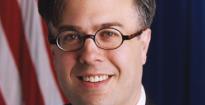Gerson: Obama Losing Religious Voters
 Michael Gerson writes:
Michael Gerson writes:
As a candidate, it was a measure of Barack Obama's political innovation and ambition that he set out to win religious voters, including evangelical Christians. As president, his failure in this effort is equally revealing.
During the campaign, Obama's brand of progressivism was refreshingly free of secularism. He combined a conciliatory message -- that believers do not need to "leave their religion at the door before entering into the public square" -- with persistent outreach to religious leaders. He affirmed the importance of faith-based organizations in the provision of social services, pledging they would "be central to our White House mission." And he made his convictions clear: "I am a Christian, and I am a devout Christian," he told Christianity Today in 2008. "I believe in the redemptive death and resurrection of Jesus Christ."
(Read more on President Obama's path to his faith and how he has kept his spirituality private.)
The ground was fertile for political sowing. Many evangelicals were weary of being associated with the harsh tone of the religious right; they were increasingly concerned with ideologically unpredictable issues such as global AIDS; and their ties to the Republican Party were somewhat strained.
On Election Day, Obama's gains among religious voters were modest but measurable. He improved on John Kerry's 2004 performance among Protestant, Catholic and Jewish voters. John McCain's support among white evangelicals remained high -- 73 percent -- but still six points below George W. Bush's results in the previous election.
It was a beginning -- that quickly ended. Growing percentages of Americans have described the Democratic Party as "unfriendly" toward religion. Obama has lost ground with religious Americans across the board, with Mormons and Protestants the most disillusioned. A recent Pew Research poll found that 42 percent of white evangelicals say they don't know what religion Obama practices. Evangelicals were a heavy presence at the Glenn Beck rally on the National Mall, and a new study by the Public Religion Research Institute has found a large conservative Christian presence in the Tea Party ranks.
There are a number of reasons for the believers' remorse. Social issues blurred during a campaign naturally become more vivid and divisive in the process of governing. Obama's campaign appeal to reconciliation -- which impressed many religious voters -- has dissolved into prickly partisanship.
But the failure of Obama's religious appeal is also ideological. It is true that evangelicals are generally not libertarian. They admit a place for government in encouraging values and caring for the needy. Yet they do not believe that governmental elites share their values or have their best interests at heart. Among conservative Christians, government is often viewed as a force of secularization -- a source of both bureaucratic regulation and moral deregulation. By identifying with expanded government, Obama fed long-standing evangelical fears of the aggressive, secular state.
Click here to read more.

